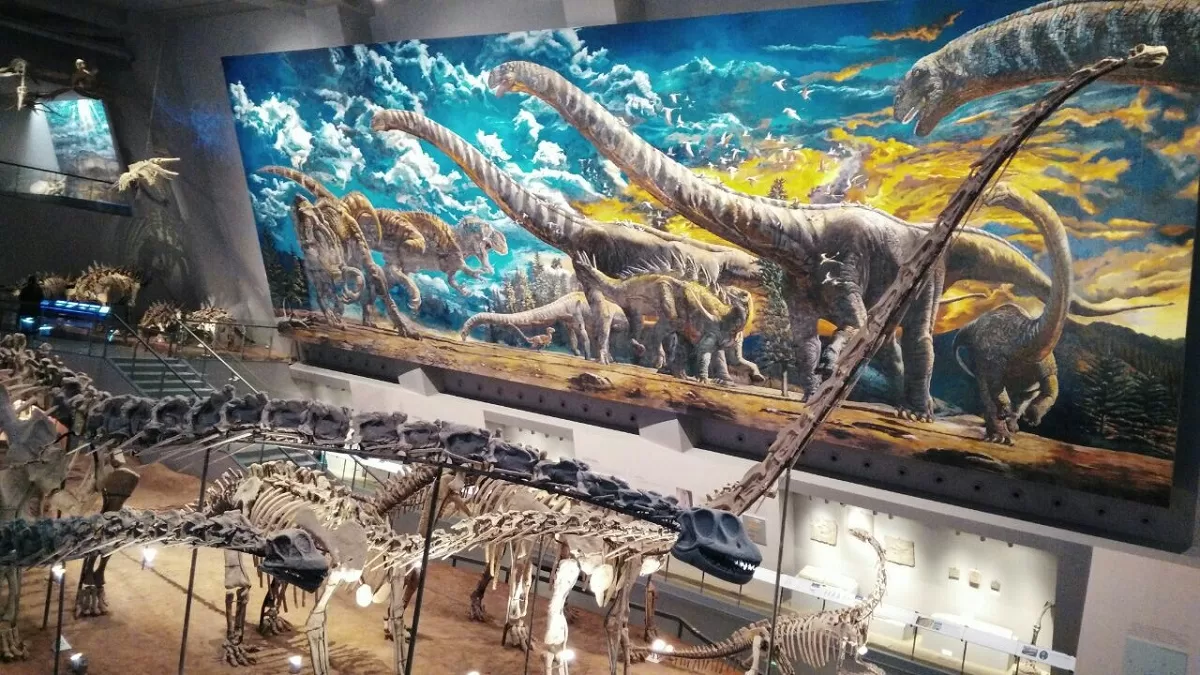Nestled at the foothills of Jinyun Mountain in Beibei, Chongqing, the new Chongqing Natural History Museum (重庆自然历史博物馆新馆) stands as a testament to the region’s commitment to preserving and celebrating the marvels of the natural world. Occupying an expansive 216 acres, with a building area of 30,842 square meters and an exhibition space of 16,252 square meters, the museum is a captivating architectural masterpiece rooted in the essence of nature.
The design inspiration for the museum emanates from the natural phenomenon of “Root-Encased Rocks,” specifically drawing from the intricate intertwining roots of Chongqing’s official tree, the “Chinese Parasol Tree” or “Huangju.” These roots, winding through the rocky terrain of Ba and Yu (巴渝), symbolize the vigorous vitality of the natural world, embodying a unique beauty.
The museum’s core exhibits are organized into six main displays: “Animal Planet,” “Dinosaur World,” “Mountain-Water Metropolis,” “Earth’s Secrets,” “Life Rapids,” and “Ecological Homestead.” These exhibitions delve into the evolution of the Earth, the diversity of life, and the magnificent landscapes of Chongqing. The emphasis is on elucidating the interconnectedness of natural resources, the environment, and human activities, advocating for a harmonious coexistence between humans and nature and promoting sustainable development principles.
With a collection exceeding 110,000 artifacts, the museum spans eight major disciplines: animals, plants, paleontology, ancient humans, old tools, geology and minerals, rocks, and soil. Noteworthy is the systematic collection of dinosaur fossils from various geological eras and a diverse array of vertebrate specimens, showcasing the rich biodiversity of the western region.
Table of Contents
- Basic Information
- Location and Transportation
- Highlights of Chongqing Natural History Museum
- Vlog about Chongqing Natural History Museum
Basic Information
| Estimated Length of Tour | 2 – 3 hours |
| Ticket Price | Free |
| Opening Hours | 9.00 – 17.00; Last admission: 16.30 Closed on Monday |
| Telephone Number | 0086-023-60313777 |
Location and Transportation
Nestled at the foothills of Jinyun Mountain in Beibei, Chongqing, the new Chongqing Natural History Museum stands as a testament to the region’s commitment to preserving and celebrating the marvels of the natural world. Its specific location is at 398 Jinhua Road, Beibei District, Chongqing. To get there, you can choose one of the following ways:
Bus: Take bus 560, 583, 590, or 592 and get off at Natural History Museum Stop (自然博物馆站).
Metro: The closest metro station to Chongqing Natural History Museum is Xinan University on line 6. After getting out of the station, transfer to a taxi or bus 588 to cover the remaining 5 kilometers.
Highlights of Chongqing Natural History Museum
Vertebrate Animals Exhibition
Embark on a captivating journey through the evolution of vertebrate animals at Chongqing Natural History Museum. This exhibit intricately weaves together the evolutionary tales of fish, amphibians, reptiles, birds, and mammals. Delve into the wonders of China’s western region and encounter a diverse array of rare and precious species, including the Chinese sturgeon, giant panda, golden snub-nosed monkey, takin, red panda, snow leopard, Reeves’s muntjac, and the vibrant Mikado pheasant. Through engaging displays, visitors gain a deeper understanding of the rich biodiversity that graces the landscapes of western China.
Dinosaur Exhibition
Step back in time to the Mesozoic era as you explore the Dinosaur Exhibition at the museum. Marvel at the impressive collection of dinosaur fossils from the Mesozoic period in the Sichuan Basin. Encounter colossal sauropod dinosaurs like the Fuxi-Zigong Long, the sword-plated Jiangbei Chongqing Long, the tail-club-wielding Li’s Sichuan Long, the formidable carnivorous Gansu Sichuan Long, the remarkably complete carnivorous dinosaur – the Ping Peace Yongchuan Long, and the locally discovered, researched, and reconstructed Xu’s Lufeng Long. This exhibition not only showcases the incredible diversity of dinosaurs but also highlights the groundbreaking contributions of local researchers to paleontological understanding.
Paleontology Exhibition
Immerse yourself in the fascinating world of ancient life with the Paleontology Exhibition. This exhibit unveils several awe-inspiring discoveries that have shocked the world, including the Cambrian Explosion witnessed in the Chengjiang Biota of Yunnan, the vibrant ancient ocean depicted in the Guizhou Dragon Biota of southwestern Guizhou, life thriving in volcanic layers as seen in the Rehe Biota of western Liaoning, and the rare find of dinosaur egg fossils in the West Xia Formation of Henan. These discoveries offer a glimpse into prehistoric times and the intricate web of life that once flourished on Earth.



The Chongqing Natural History Museum is divided into two areas. The old museum is located at 74 Pipashan Street in Chongqing, while the new museum is located at 398 Jinhua Road in Beibei District, Chongqing. The new museum is larger in scale and has more exhibits, so when most people mention the Chongqing Natural History Museum, they are referring to the new museum.